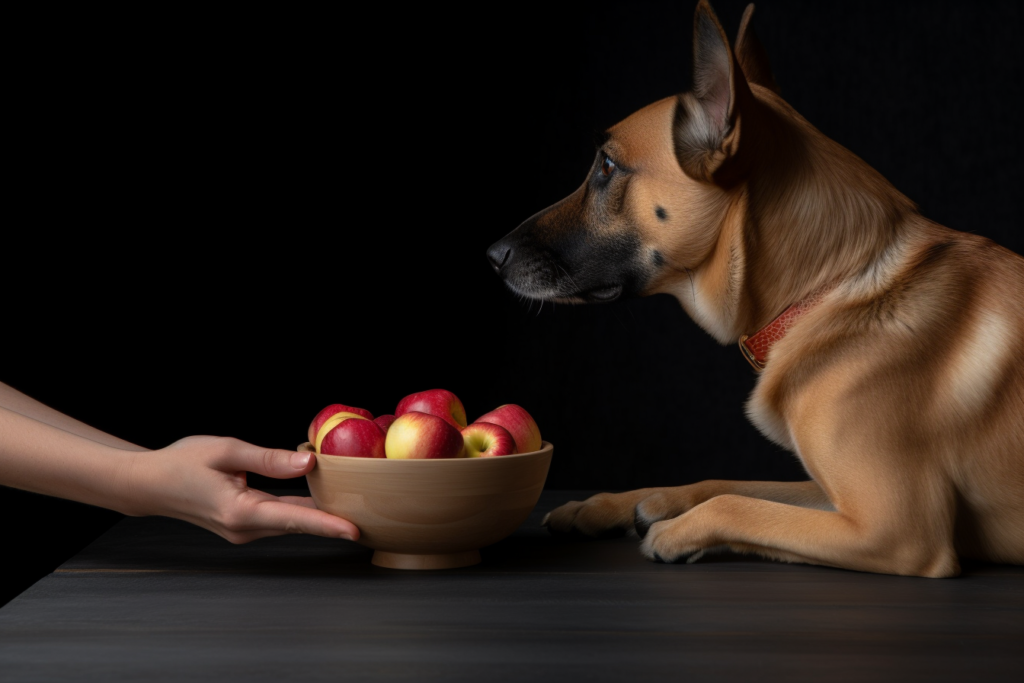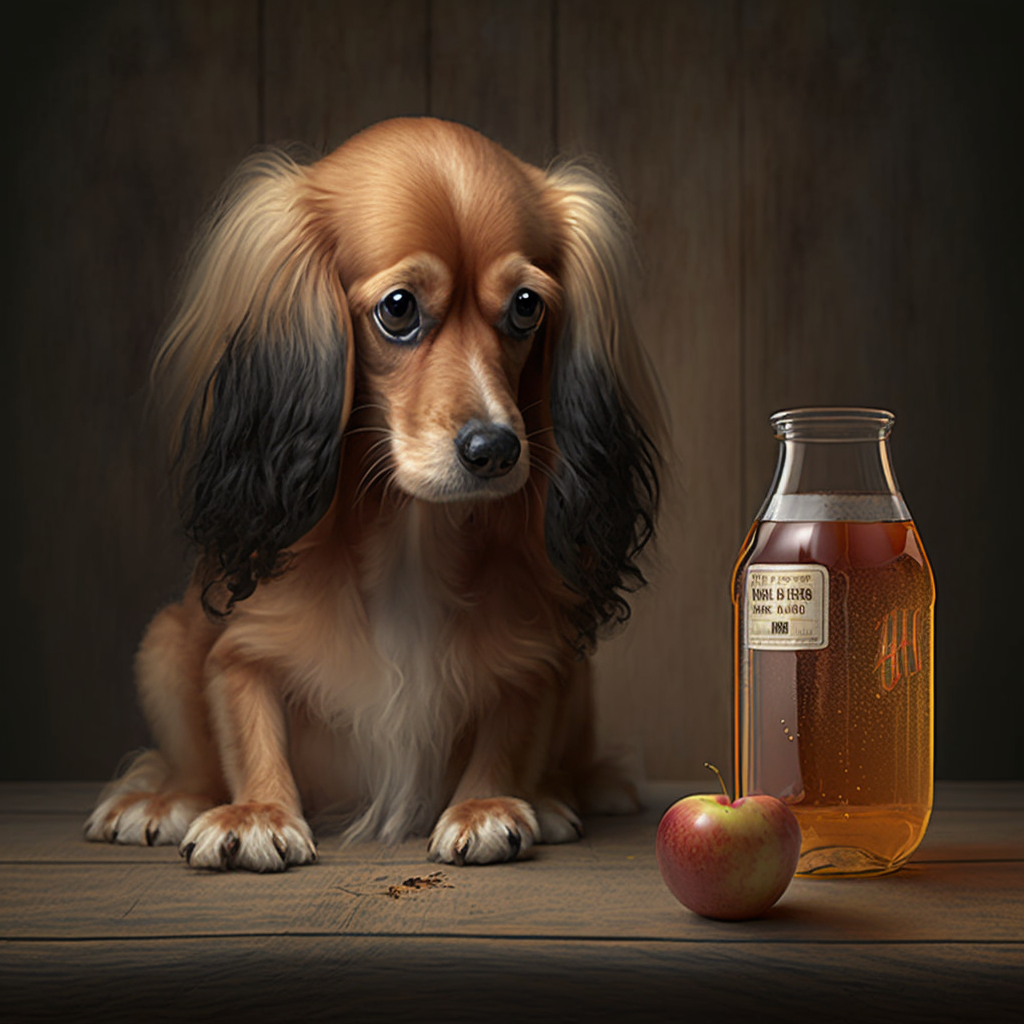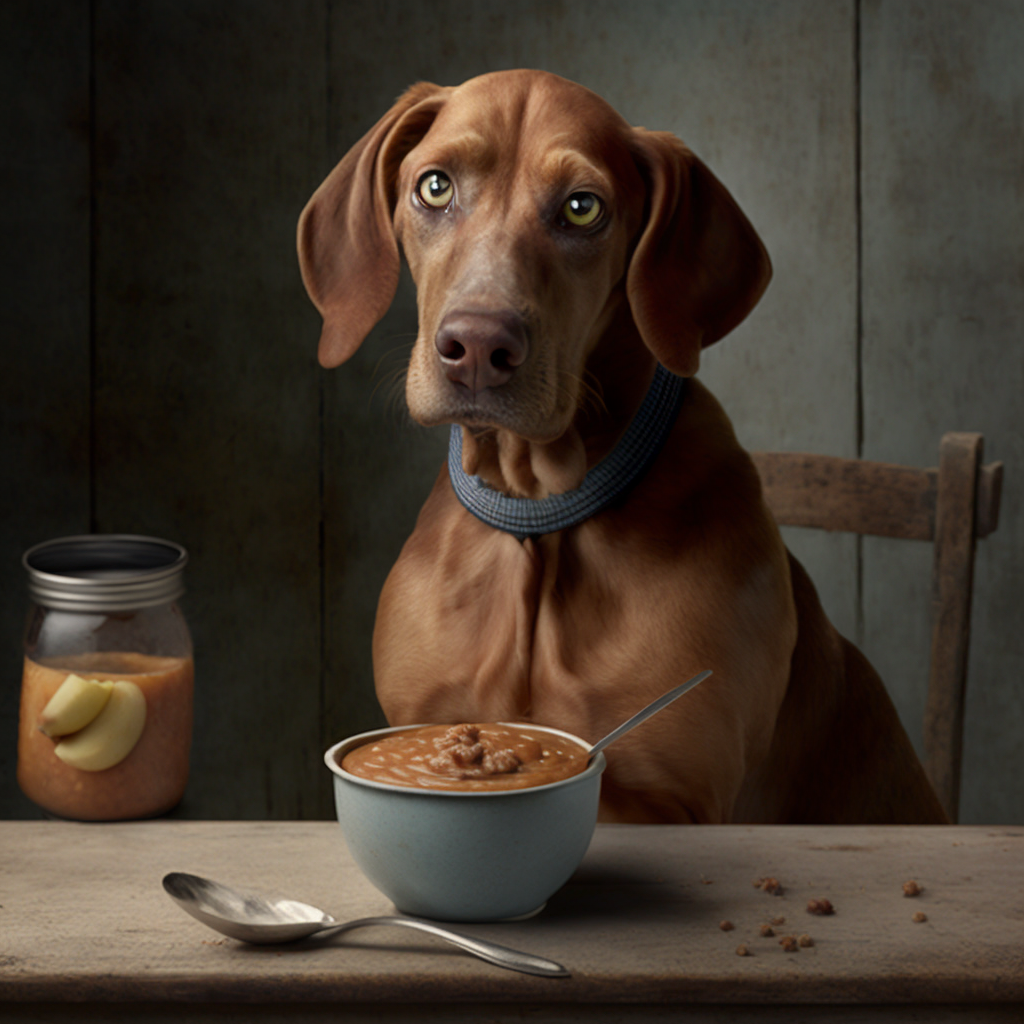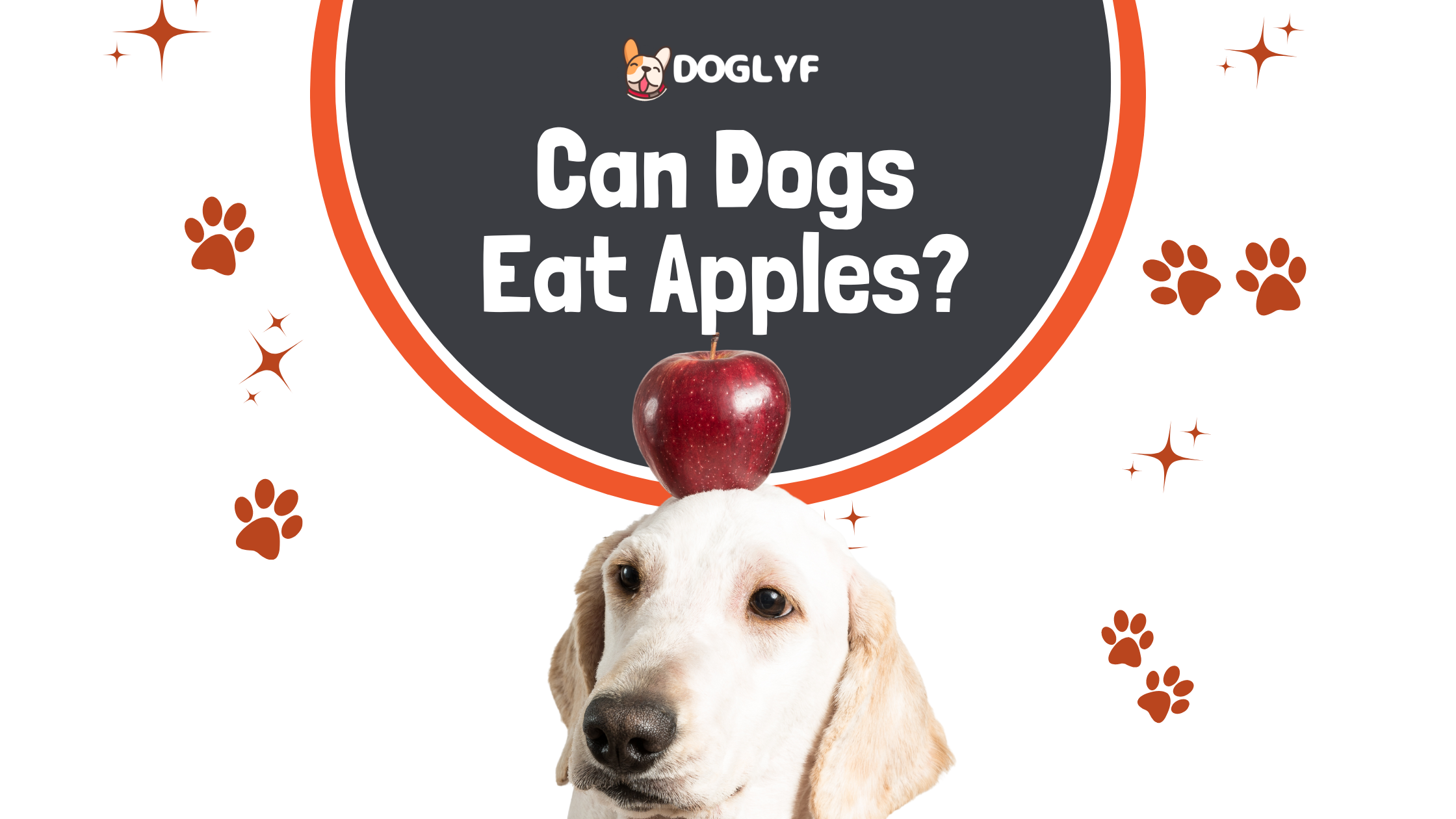This post may contain affiliate links. For more information about my affiliate disclosure, please click here
As the saying goes, ‘an apple a day keeps the doctor away,’ but have you ever wondered if this age-old adage also applies to our four-legged friends?
We know that apples are packed with vitamins and nutrients essential for maintaining good health in humans, so it’s only natural to want to share these benefits with our beloved dogs.
As responsible pet parents, we strive to provide them with the best care possible, including wholesome foods that taste great and promote their overall wellbeing.
In this article, we’ll explore whether or not sharing an apple with your canine companion is a wise choice by taking a closer look at how their bodies process and benefit from consuming this popular fruit.

Also Read, Brain Training For Dogs Review From an Expert – Is it Worth it Or not in 2023?
While most of us might be inclined to believe that what’s healthy for us must surely be safe for our pets too, it’s important to recognize that sometimes there can be unexpected consequences when introducing new foods into their diets.
So before you go tossing Fido a slice of Granny Smith, let’s dive deeper into understanding just how apples affect our furry friend’s health and wellness.
You can also find other foods using our Can Dogs Eat Tool!
Table of Contents
Nutritional Value of Apples (per 100Gms)
Here is a table of the nutritional value of apples per 100 grams for dogs:
| Nutrient | Amount per 100g |
|---|---|
| Calories | 52 kcal |
| Carbohydrates | 14 g |
| Fiber | 2.4 g |
| Protein | 0.3 g |
| Fat | 0.2 g |
| Vitamin C | 4.6 mg |
| Vitamin K | 2.2 mcg |
| Potassium | 107 mg |
| Calcium | 6 mg |
| Iron | 0.1 mg |
Apples are a great snack for dogs, and they provide many nutritional benefits. One medium-sized apple contains around 100 calories, which is a reasonable treat for a small to medium-sized dog.
Apples are low in protein and fat, but they are high in fibre, which can help promote a healthy digestive system in dogs. Apples are also a good source of vitamin C and potassium, essential nutrients for dogs.
Vitamin C can help boost the immune system and support the production of collagen, which is important for healthy skin and joints. Potassium is necessary for proper muscle and nerve function. Additionally, apples are a low-calorie, crunchy snack that can help keep dogs’ teeth clean and healthy.
While apples are generally safe for dogs to eat, it’s important to remember to remove the seeds and core, as they can be a choking hazard and contain trace amounts of cyanide. Adding small amounts of apples to your dog’s diet can be a healthy and enjoyable treat for them.
Also read, Beyond the Fluff: Exploring 5 Cliched Personality Traits of White Golden Retrievers
Can Dogs Eat Apples

Can dogs eat apples?
That’s a question many pet owners wonder as they strive to provide the best possible nutrition for their furry friends.
- The good news is that, yes, apples can be a healthy and delicious treat for your dog! However, it’s important to be mindful of potential apple allergies, digestion issues, and portion control when introducing this fruit into your pup’s diet.
Apples offer dental benefits and nutritional value, making them an attractive snack option for canines.
Rich in vitamins A and C, high in fiber, and low in fat – these treats are a great way to support your dog’s overall health while satisfying their sweet tooth. Additionally, chewing on apple slices can help clean your dog’s teeth by removing plaque buildup.
As you consider incorporating apples into your dog’s diet, remember that not all dogs will react the same way – some may experience digestion issues or even exhibit signs of an allergy after consuming this tasty fruit. In such cases, consult with your vet about appropriate apple alternatives for your beloved pet.
When serving apples to your canine companion, safe preparation is crucial. Remove any seeds or stems before offering them to your pooch since these parts contain cyanide which can be harmful to dogs if ingested in large quantities over time.
Be sure to practice proper portion control as well; moderation is key when feeding fruits like apples because too much sugar can lead to stomach upset or weight gain.
Now that we’ve covered how safely preparing regular apples for our pets let us explore another commonly asked question: ‘Can dogs eat green apples?
Also Read, Can Dogs Eat Strawberries? 6 Essential Facts & 1 Crucial Warning – Unleash the Truth Today!
Can Dogs Eat Green Apples

A surprising 56% of dog owners share fruits and vegetables with their canine companions, according to a study by the University of Guelph. With that in mind, it’s essential to understand whether green apples are safe for dogs.
Green apple benefits extend beyond humans; they can also provide valuable nutrients such as vitamin C and fibre for our furry friends.
However, before serving green apples to your dog, consider these important factors:
- Allergic reactions: Though rare, some dogs might be allergic to apples.
- Choking hazards: Apple seeds contain cyanide which is toxic to dogs; always remove them beforehand.
- Dental health impact: Crunching on hard apples may cause tooth fractures in smaller breeds or those with dental issues.
- Proper portion sizes: Large amounts of any fruit can lead to gastrointestinal discomfort or diarrhea.
- Green apple preparation: Wash thoroughly and cut into small pieces suitable for your dog’s size.
Despite the advantages of green apples, it’s crucial to keep an eye out for signs indicating whether your pet has taken well to this new addition in their diet. If you notice an upset stomach or other adverse effects after feeding green apples, consult a veterinarian immediately.
There are various green apple alternatives worth exploring, like blueberries or carrots – each offering unique nutritional benefits without compromising your dog’s wellbeing. Remember that moderation is key when introducing any novel food item into your pup’s daily meals.
Now that we’ve covered the ins and outs of safely sharing green apples with our beloved pets let us move forward and explore another commonly asked question regarding apples – ‘can dogs eat apple skin?’
Also Read, Can Dogs Eat Bananas? Is it yay or nay for dogs?
Can Dogs Eat Apple Skin

While green apples are indeed safe for your canine companion, the question of whether dogs can eat apple skin remains.
Apple skins have their own set of benefits and potential hazards that pet owners should be aware of before feeding them to their furry friends. The key lies in understanding the pros and cons associated with apple skin consumption by our four-legged companions.
One significant advantage is the nutrient content found within apple skins. They’re packed with vitamins A and C, fiber, antioxidants, and various essential minerals – all beneficial components contributing to a dog’s overall health.
However, there are also concerns regarding potential choking hazards posed by apple skin if not appropriately prepared or served.
- Additionally, some dogs may experience digestion issues due to apple skin’s fibrous nature, which might cause stomach discomfort or diarrhea in sensitive individuals. Furthermore, it’s crucial to keep an eye out for any allergic reactions as every dog reacts differently to different foods.
To ensure a positive experience for both you and your pooch while incorporating apple skin into their diet, follow these guidelines:
- opt for organic apples free from harmful pesticides;
- thoroughly wash the fruit under running water;
- remove any seeds or core before serving;
- consider finely chopping or pureeing the apple skin to reduce choking risks and aid digestion.
By taking these precautions and monitoring how your dog responds after eating small amounts at first will help determine if this treat is suitable long-term addition to their diet plan.
With careful consideration, we can now explore another form of this fruity delight – let’s delve into whether dogs can enjoy applesauce!
Can Dogs Eat Apple Sauce

Now that we’ve established that dogs can enjoy apples as a tasty and nutritious treat, you may wonder if they can consume applesauce too.
Applesauce is typically made from cooked and pureed apples, which means it contains many of the same nutrients found in whole apples such as vitamins A and C, potassium, calcium, and fiber.
These nutrients support your dog’s overall health by promoting healthy skin, coat, immune system function, digestion and more.
Furthermore, because applesauce has a smooth texture with no hard or sharp pieces like raw apple slices do (which pose choking hazards), it may be easier on your dog’s digestive system – especially if they have any existing concerns or sensitivities.
However, be mindful of potential allergy risks associated with feeding your pet store-bought options since these products often contain added sugars and preservatives not recommended for dogs’ consumption.
To avoid this issue altogether, consider creating homemade recipes using only natural ingredients tailored specifically to your pup’s dietary needs.
When introducing applesauce into your dog’s diet, start small and watch for any signs of discomfort or adverse reactions such as vomiting or diarrhea. If all goes well during this initial trial period – congratulations! You’ve successfully added another delicious snack option for Fido to savor alongside his regular meals.
As always though when experimenting with new foods: moderation is key. Treats should never exceed 10% of your pet’s daily caloric intake so adjust portion sizes accordingly based on their size and activity level.
Remember also to keep an eye out for dental hygiene issues stemming from excessive sugar exposure even in all-natural varieties without sweeteners added; brushing regularly will help prevent plaque buildup leading ultimately gum disease down line potentially compromising their overall health.
With these precautions in mind, your dog can enjoy the occasional serving of applesauce as a healthy and delicious treat.
Now let’s explore another apple-related question: Can dogs safely consume apple seeds? The answer to that may surprise you!
Can Dogs Eat Apple Seeds

While apples themselves can be a healthy and delicious treat for your furry friend, it’s important to consider the potential dangers of apple seed consumption. Apple seeds contain a compound called amygdalin, which can break down into hydrogen cyanide when ingested. This chemical is toxic to dogs and can cause serious health issues or even death in extreme cases.
Apple seed toxicity: Even though only small amounts of cyanide are released during digestion, repeated exposure through frequent ingestion of apple seeds may lead to symptoms such as difficulty breathing, seizures, and even coma.
Seed ingestion dangers: Larger dogs might not show immediate symptoms after consuming just one or two seeds; however, smaller breeds could suffer from more severe effects due to their lower body weight. It’s always best to avoid any risk by preventing seed consumption altogether.
Cyanide poisoning symptoms: If you suspect your dog has ingested apple seeds and is experiencing signs like dilated pupils, excessive drooling, vomiting, rapid breathing, or muscle tremors, consult with a veterinarian immediately.
To ensure that your pet enjoys safe apple treats without the risk of accidental poisoning, there are several precautions you can take.
First and foremost is proper seed removal before serving apples to your dog. Employing various seed removal techniques – such as using an apple corer or simply cutting around the core – will help prevent any chance of seed intake.
Additionally, monitoring how much of these fruits they’re eating is essential since moderation is key for maintaining balanced nutrition.
As responsible pet owners looking out for our canine companions’ well-being, we must remain vigilant about what goes into their diets while still allowing them some enjoyable treats along the way!
With this newfound knowledge on avoiding harmful substances found within seemingly harmless foods like apples and their seeds at hand – let’s switch gears now towards exploring another popular query: whether dogs can safely indulge in sweet confections such as apple pie.
Can Dogs Eat Apple Pie

While dogs can safely enjoy apples, it’s important to consider the pie ingredients before sharing a slice of apple pie with your furry friend.
Many store-bought and homemade pies contain harmful substances for pets, such as sugar, nutmeg, raisins or chocolate that could lead to serious health issues. In addition, some recipes might include xylitol–a common artificial sweetener–which is extremely toxic to dogs.
When thinking about dog digestion and safe desserts for our canine companions, there are many baking alternatives available. If you’d like to treat your pet while keeping their well-being in mind, look up recipes specifically designed for dogs.
These usually exclude any potentially hazardous ingredients related to apple toxicity and use healthier substitutes such as honey, pumpkin puree or unsweetened yogurt instead of sugars or heavy creams. With these options, both you and your dog can indulge in a delightful dessert experience without compromising anyone’s health! Remember that even when offering healthy treats, moderation is key; too much of anything isn’t good for them.
To provide wholesome homemade snacks without risking any adverse effects on your pup’s tummy, make sure you know which fruits and veggies are suitable for dogs—apples being one of them—and always remove seeds and cores beforehand.
By focusing on using approved ingredients in appropriate quantities while avoiding those linked with potential risks, you’ll be able to create deliciously nutritious goodies for your pooch. Armed with this knowledge about responsible treat-giving practices and love-infused cooking techniques at hand let us now explore another popular apple product: ‘can dogs eat apple cider vinegar?’.
Can Dogs Eat Apple Cider Vinegar

While apple pie may not be the best choice for your furry friend, there is another apple-related product that could offer some benefits: apple cider vinegar.
Apple cider vinegar (ACV) has gained popularity in recent years due to its potential health advantages for both humans and pets alike. From flea prevention to ear cleaning, ACV can serve as a natural remedy for various issues faced by our canine companions.
However, dosage precautions are essential when considering giving your dog ACV since vinegar toxicity can occur if used excessively or improperly. As with any homemade remedies, it’s crucial to consult with your veterinarian before incorporating ACV into your pet care routine.
When used correctly, ACV offers digestive aid and can help maintain a proper pH balance in your dog’s body, contributing to their overall well-being.
So instead of sharing an apple pie slice with your pooch, consider exploring the numerous benefits of apple cider vinegar. Remembering always to prioritize safety and adhere to appropriate dosages will ensure you maximize the positive effects without causing harm.
Now that we’ve explored how dogs might benefit from certain components found within apples let’s delve deeper into whether they enjoy this fruit blended together with another popular treat – peanut butter!
Can Dogs Eat Apples With Peanut Butter

While apples on their own can be a healthy and tasty treat for dogs, adding peanut butter introduces both benefits and potential risks. Peanut butter is packed with protein, healthy fats, vitamins B and E, and niacin, all of which contribute to the overall health of your furry companion.
However, it’s essential to consider allergy concerns when introducing any new food into your dog’s diet – this includes peanuts or peanut products. Despite its nutritional value, moderation is key when offering peanut butter as a treat due to its high-fat content. Excessive consumption may lead to weight gain or even pancreatitis in some cases.
Safe combinations such as apple slices spread thinly with peanut butter can minimize choking hazards while still providing an enjoyable snack for your pet. Additionally, you should always opt for natural peanut butters without added sugar or artificial sweeteners like xylitol – commonly found in ‘sugar-free’ varieties – as these additives can be toxic to dogs.
Treat alternatives could involve incorporating other fruits (e.g., bananas) with more subtle flavors that complement the taste of peanut butter; however, always research beforehand if certain foods are safe for canine consumption. Alternatively, considering portion control methods (such as using small cookie cutters) will ensure appropriate serving sizes tailored specifically for your dog’s size and dietary needs.
As we continue exploring various ways in which you can serve apples safely to our four-legged friends let us shift focus towards another interesting combination: applesauce with cinnamon!
Can Dogs Eat Applesauce With Cinnamon

Imagine a warm, inviting kitchen filled with the sweet aroma of cinnamon and applesauce. The delightful scent can be irresistible not only to us but also to our furry companions who may want to share in the delicious treat. But is it safe for dogs? Can they enjoy applesauce with cinnamon as we do?
Cinnamon benefits humans by providing antioxidants and anti-inflammatory properties; however, when it comes to our canine friends, caution must be exercised. Although cinnamon itself is non-toxic to dogs in small amounts, too much of it can lead to cinnamon toxicity which could cause health issues such as vomiting or diarrhea.
On the other hand, applesauce aids digestion and can provide an easy-to-eat nutritious snack for your pup – especially if you opt for homemade applesauce without added sugar or preservatives. So while it’s okay for them to have a lick or two of applesauce mixed with cinnamon occasionally, make sure you are aware of the appropriate cinnamon dosage for your dog’s size and consider offering them healthier alternatives like plain applesauce treats.
Before setting down that bowl of spiced applesauce for Fido, take another moment to think about other ways you might satisfy their craving while ensuring their safety. Applesauce alternatives include slices of fresh apple (without seeds), unsweetened canned pumpkin puree, or even mashed banana – all excellent additions to homemade dog biscuits or frozen snacks that offer both nutrition and enjoyment for your beloved pet.
By choosing these options instead, not only will you protect your dog from potential harm caused by excessive spices like cinnamon but also pave the way towards discovering new tasty delights they’ll love just as much! Now let’s explore how apple chips fit into this picture…
…by providing a healthy, natural, and delicious alternative to cinnamon treats, ensuring that your furry friend can enjoy a tasty snack without any risks associated with harmful ingredients.
Can Dogs Eat Apple Chips

Moving on from applesauce with cinnamon, a popular question among pet owners is whether dogs can safely consume apple chips. Apple chips are dried slices of apples that have been baked or dehydrated to create a crispy and delicious snack. Just like humans, many dogs enjoy the taste and texture of these crunchy treats. However, before you start sharing your apple chips with your furry friend, it’s crucial to understand their benefits and potential risks.
Apple chip benefits for dogs include:
- Nutritional value: Apple chips retain most of the vitamins and minerals found in fresh apples, such as vitamin C, potassium, and fiber.
- Dental health: The crunchy texture of apple chips may help clean your dog’s teeth while they chew.
- Homemade recipes: By making apple chips at home, you can control the ingredients used and ensure there are no harmful additives or excessive sugars.
That being said, there are some precautions to keep in mind when offering apple chips to your canine companion. First, always practice portion control – too many apple chips can lead to gastrointestinal issues due to their high fiber content.
Additionally, be mindful of any allergic reactions; although rare, some dogs might have sensitivities to certain fruits or preservatives used in store-bought apple chips. In such cases, consider looking into chip alternatives made from other types of fruits or vegetables that pose less risk for allergies.
Remember that moderation is key when introducing new foods into your dog’s diet. While apple chips make for a tasty treat every now and then, it’s important not to rely solely on them for nutrition – a well-balanced diet should always take precedence over occasional snacks.
As long as you’re keeping an eye on portion sizes and monitoring your dog for any adverse reactions after consumption, feel free to let them indulge in this healthy snack alongside you!
Frequently Asked Questions
Are There Any Specific Apple Varieties That Are Better Or Worse For Dogs To Consume?
Is there anything more heartwarming than seeing your furry friend enjoy a delicious, seasonal treat?
When it comes to apple varieties and their potential toxicity for dogs, there isn’t necessarily a ‘best’ or ‘worst’ type of apple. However, some factors to consider include the size of the apple in relation to different dog breeds and whether organic options might be safer due to fewer pesticides.
The main concern with apples is actually not the variety, but rather the presence of apple seeds which contain trace amounts of cyanide that can be harmful if consumed in large quantities. Therefore, avoid giving whole apples with seeds to your pets.
Cooking apples may help reduce any pesticide residue as well as soften them up for easier digestion by our canine companions.
In conclusion, while there’s no specific ‘better’ or ‘worse’ variety when it comes to feeding your pooch these scrumptious seasonal treats, always exercise caution by removing apple seeds before serving them up!
How Often Can Dogs Safely Eat Apples As A Treat Or Snack?
Incorporating apples into your dog’s diet as a treat or snack can be a delightful addition to their canine nutrition, but it’s important to follow some apple safety tips to ensure they’re enjoying these fruit-based treats in moderation.
Generally, offering your furry friend apples occasionally and in small amounts is the key; think of them as seasonal snacking options or treat alternatives rather than daily staples.
When preparing apples for your pup, always remove the core and seeds since they contain hazardous substances like cyanide.
Opting for organic apples can help minimize pesticide exposure too.
Remember that every dog is unique, so closely monitor how yours reacts after consuming apples to determine if this scrumptious snack is an ideal fit for their individual needs while continuing to provide love and care for your loyal companion.
Can Apple Consumption Have Any Specific Health Benefits For Dogs, Such As Improved Digestion Or Dental Health?
Once upon a time in the veterinary realm, it was discovered that apple antioxidants could work wonders for our canine companions.
Not only do these juicy fruits provide dental benefits by helping to clean dogs’ teeth and freshen their breath, but they also supply an ample amount of apple fiber which acts as a digestion aid.
Also read, Dog Dental Care 101 – How Many Teeth Do Dogs Have?
Furthermore, apples offer a vitamin boost to support overall health and immune function.
As if that wasn’t enough, indulging your pup with this wholesome treat can even contribute to weight management due to its low-calorie content!
So go ahead and share nature’s candy with your furry friend – just remember to remove the core and seeds first – and watch them reap the bountiful benefits all while keeping those tails wagging.
Are There Any Potential Allergic Reactions Or Side Effects That Dogs May Experience From Eating Apples?
While apple allergies in dogs are relatively rare, it’s important to be aware of potential reactions and side effects that may arise from your furry friend consuming this fruit.
Choking hazards can occur if large pieces or the entire core is ingested; therefore, always slice apples into small bites and remove seeds before serving them to your pet.
In addition to seed dangers, pesticide risks should also be considered by thoroughly washing apples prior to feeding.
Overindulgence in apples could lead to diarrhea prevention, so maintaining proper serving sizes is essential for a healthy diet.
Some dogs might experience skin irritation due to an allergic reaction, but these cases are typically scarce.
Keeping a watchful eye on your dog after their first taste of apple will help you ensure they enjoy this tasty treat without any complications.
What Are Some Creative Ways To Incorporate Apples Into A Dog’s Diet Or Use Them As A Training Reward?
Incorporating apples into your dog’s diet can be both fun and beneficial for their health! Get creative by making Apple Popsicles to help them cool down on a hot day, or mix some diced apples into their Fruity Kibble for added vitamins.
For training rewards, try whipping up some Apple Peanut Butter Treats that they’ll surely love. Dehydrated Apple Rings make great chewy snacks and Apple Infused Water provides a refreshing hydration boost.
You can also stuff an apple slice into a puzzle toy or treat-dispensing ball to keep them entertained while promoting healthy eating habits. Finally, why not combine mealtime with playtime by creating delicious Apple Turkey Bites?
Your furry friend will thank you as they relish these tasty treats and reap the nutritional benefits of apples in various forms!
Conclusion
In conclusion, apples symbolize a sweet and healthy treat for our furry friends. They offer numerous benefits to their well-being while satisfying their taste buds. Just be mindful of the frequency in which you share these tasty morsels with your beloved canine companion.
As responsible pet parents, it is essential to monitor any potential side effects or allergies that may arise from apple consumption. By doing so, we ensure a happy and fruitful relationship between dogs and this delicious fruit.
